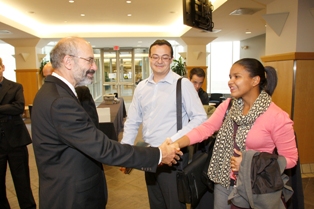Jules Lobel talks about fighting the "legal black hole" for Guantanamo prisoners
 DETROIT - Winning a "tremendous victory" in court doesn't always lead to success, said civil rights expert Jules Lobel, president of the Center for Constitutional Rights and a law professor at the Pittsburgh School of Law.
DETROIT - Winning a "tremendous victory" in court doesn't always lead to success, said civil rights expert Jules Lobel, president of the Center for Constitutional Rights and a law professor at the Pittsburgh School of Law.
He spoke Sept. 20 at Wayne State University Law School's Damon J. Keith Center for Civil Rights. Lobel is co-author of the award-winning book, "Less Safe, Less Free: Why America is Losing the War on Terror." His topic at Wayne Law was the Guantanamo Bay detention center in Cuba, where nearly 170 prisoners are still held, even though many of them have been found to have no connection to terrorists and have been "cleared for release or transfer," Lobel said. "Eighty-seven people who shouldn't be there are still there."
Some have been referred to military tribunals. The rest exist in a "legal black hole," he said.
The prisoners are being held in indefinite "preventive detention" without due process under American law, considered a right in criminal cases, and without adherence to the bulk of the Geneva Convention, considered a right for prisoners in international war. In some cases, the detainees don't know the charges against them and have no avenue or means to try to show their innocence if they did know, he said.
"In 2004, we won a tremendous victory (in Rasul v. Bush)," Lobel said. "The court said that the habeus statute (giving prisoners the right to face their accusers in court to determine the legality of their confinement) covers detainees at Guantanamo. We had won a tremendous victory - or so we thought."
While hundreds of Guantanamo prisoners were released as a result of the 2004 litigation, and conditions in the detention center have improved somewhat, hundreds more remain, due to decisions by the U.S. Court of Appeals in the District of Columbia considering the holding of uncharged prisoners allowable under expanded executive powers due to the "war on terror." The U.S. Supreme Court has refused to review the issues, Lobel said.
He spoke of lessons he's learned through the ongoing legal battles by the Center for Constitutional Rights to bring justice to innocent people arrested since Sept. 11, 2001, never charged, and held indefinitely at Guantanamo.
"Rights are useful," Lobel said. "They're very important. But they're not sufficient. They have to be tied to a political action.
"The second lesson I learned from this is that the divide between winning and losing is not as great as we think it is. Reality is more complex. Reality is more nuanced."
But he will continue the fight, he added.
"The long-term struggle is what is key," Lobel said. "We're not giving up. We will continue to challenge this. The story is not written. I think our real task is to resist oppression. When faced with oppression the key thing is to resist. We will not accept oppression without a fight."
The next lecture event sponsored by the Keith Center will be Oct. 16, when Public Justice Executive Director Arthur Bryant will talk about his decades as a pioneering public interest attorney during the inaugural event in the Dean A. Robb Public Interest Lecture Series. The event, free and open to the public, is set from 5:30 to 8 p.m. in the Spencer M. Partrich Auditorium at the Law School, 471 W. Palmer St.
The Keith Center promotes civil rights educational opportunities and encourages research on racial justice issues, including housing segregation, inadequate and segregated education, and unequal economic opportunities, with a particular focus on southeastern Michigan. It also contributes to the development of the next generation of civil rights advocates by providing opportunities to work with leading civil rights organizations and providing scholarships to Wayne Law students interested in pursuing civil rights law.
Photo Caption: Award-winning author Jules Lobel (left), president of the Center for Constitutional Rights and a law professor at the Pittsburgh School of Law, chats with third-year law students Michael Kiehn and Zoila Delcastillo. Lobel presented a recent lecture, "Victory Without Success: Has the Guantanamo Litigation Led to Permanent Wartime Preventive Detention," sponsored by the Damon J. Keith Center for Civil Rights at Wayne State University Law School.